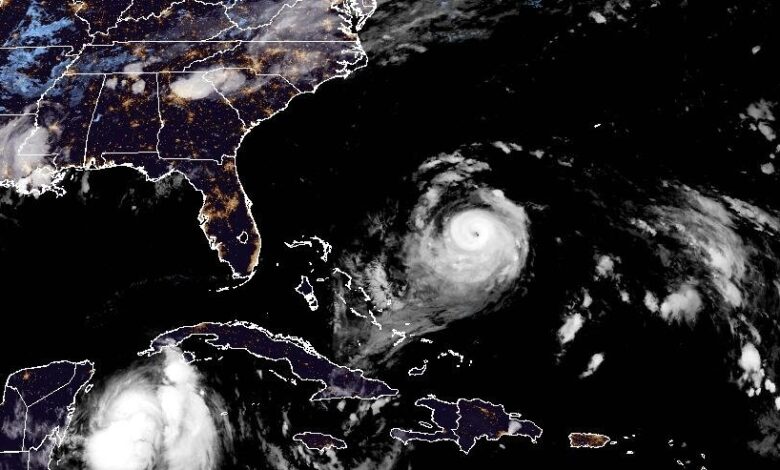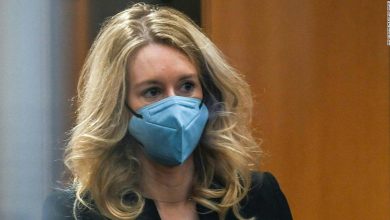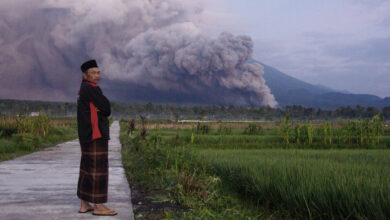Hurricane Franklin Intensifies Into a Category 3 Storm

Hurricane Franklin became the first major hurricane of the 2023 Atlantic hurricane season on Monday and would probably create swells that would require watches for Bermuda on Monday, the National Hurricane Center said.
The storm’s maximum sustained winds increased to almost 115 miles per hour, with higher gusts, the center said, making Franklin a Category 3 hurricane.
A “major hurricane” has sustained winds of 111 m.p.h. or greater, corresponding to a Category 3, 4 or 5 hurricane.
Some strengthening is forecast for Monday, the center said, “but gradual weakening is expected to begin by Tuesday afternoon.”
The storm is expected to cause life-threatening surf and rip currents through the beginning of this week along parts of the East Coast and then weaken in three to four days. Swells generated by Franklin had begun to affect Bermuda as of Sunday night.
Elsewhere, Tropical Storm Idalia was expected to strengthen into a hurricane on Monday and hit the Gulf Coast of Florida by Tuesday, forecasters said.
Franklin left at least one person dead in the Dominican Republic and hundreds of thousands of homes without power or potable water last week.
More than 500 homes were damaged in the Dominican Republic and more than 2,500 roads were affected, leaving six communities cut off, officials said. At one point, 350,000 homes were without power, and more than 1.6 million did not have potable water.
Carlos Marino Martínez, 33, was killed when he was swept away by floodwaters in the city of San Cristobal, according to the Civil Defense, a government agency in the Dominican Republic. Two women were hospitalized after a landslide in San Cristobal, officials said.
Tropical Storm Emily was downgraded on Monday to a post-tropical cyclone after forming the day before, and Gert was also short-lived. Tropical Storm Harold formed early Tuesday in the Gulf of Mexico and made landfall in Texas in the morning.
Don, which briefly formed as a hurricane in July, was the first hurricane of the Atlantic season.
The Atlantic hurricane season started on June 1 and runs through Nov. 30.
In late May, the National Oceanic and Atmospheric Administration predicted that there would be 12 to 17 named storms this year, a “near-normal” amount, forecasters said. On Aug. 10, NOAA officials increased its estimate to 14 to 21 storms.
There were 14 named storms last year, coming on the heels of two extremely busy Atlantic hurricane seasons in which forecasters ran out of names and had to resort to backup lists. (There were a record 30 named storms in 2020.)
This year features an El Niño pattern, which started in June. The intermittent climate phenomenon can have wide-ranging effects on weather around the world, and it typically impedes the number of Atlantic hurricanes.
In the Atlantic, El Niño increases the amount of wind shear, or the change in wind speed and direction from the ocean or land surface into the atmosphere. Hurricanes need a calm environment to form, and the instability caused by increased wind shear makes those conditions less likely. (El Niño has the opposite effect in the Pacific, reducing the amount of wind shear.)
At the same time, this year’s heightened sea surface temperatures pose a number of threats, including the ability to supercharge storms.
That unusual confluence of factors has made making storm predictions more difficult.
There is consensus among scientists that hurricanes are becoming more powerful because of climate change. Although there might not be more named storms overall, the likelihood of major hurricanes is increasing.
Climate change is also affecting the amount of rain that storms can produce.
In a warming world, the air can hold more moisture, which means that a named storm can hold and produce more rainfall, as Hurricane Harvey did in Texas in 2017, when some areas received more than 40 inches of rain in less than 48 hours.
Orlando Mayorquin, Rebecca Carballo, Melina Delkic, Mike Ives, Lauren McCarthy, Eduardo Medina, Christopher Mele, Claire Moses, Chris Stanford, Livia Albeck-Ripka and John Yoon contributed reporting.



